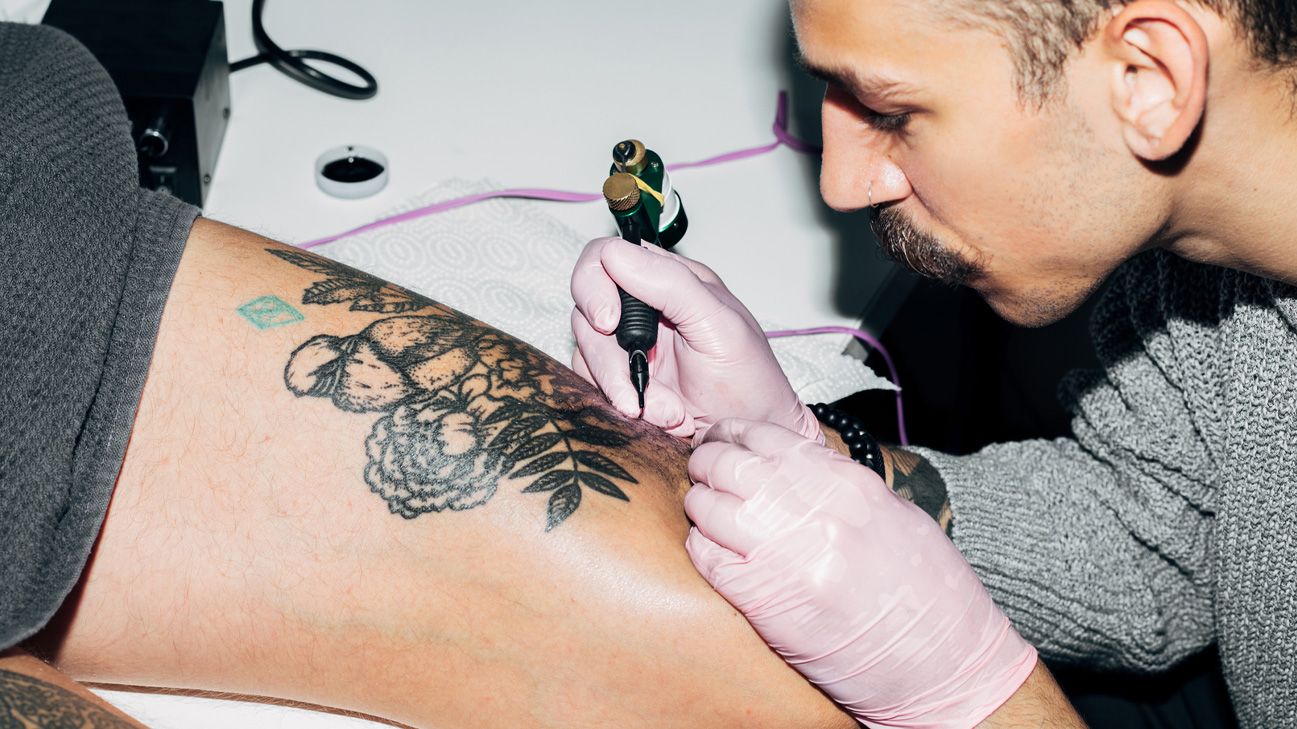Tattoos can be therapeutic for some, helping them overcome anxiety and mental health struggles.
Tattoos have long been a flex in personal expression and artistry. For some peeps, they’re the go-to for commemorating life wins or solidifying deep-seated beliefs — from quotes that got you through dark times or portraits of your fave pets.
The act of getting inked can also be a profoundly therapeutic experience. The machine’s buzz and the needle’s sharp sting are part of a ritual that may help bring internal battles to the surface. But is there a link between anxiety and the decision to get tatted? Could framing your fears and anxieties in gorgeous designs help you cope? Continue reading to find out.

For many, tattoos are much more than art. Peeps who have anxiety may get tattoos as a way of taking control over their narrative, including their mental health struggles.
Anxiety disorder makes life challenging, and you may feel you’re stuck in a rip tide of continual worry, fear, and dread. Even if you know it’s the anxiety talking, you can still struggle to contain these overwhelming feelings, and it’s exhausting. Anxiety can trick your mind, tell you you’re unworthy, and there’s no way out.
But here’s where tattoos come into play — they create a visual shoutout to your strength and resilience. Imagine marking your skin with reminders of the battles you’ve won and what you’ve overcome.
Getting inked can feel like grabbing the reins back from anxiety and stress. A tattoo is an affirmation. It can turn your invisible battle scars into something tangible and beautiful, giving a sense of ownership over your body and experiences. This is huge when anxiety tries to convince you that you don’t have a say in your own story.
Whether it’s a poignant quote, a symbolic image, or just a badass design, a tattoo packs a punch of personal significance and your enduring strength. You’ve taken a deliberate, proactive step to help you take greater control over your life, and that should be celebrated.
Psychologically, tattoos are visual high-fives to yourself. For the anxious folks, tats are a way to take those messy, abstract feelings and pin them down in something real and tangible.
There’s also some evidence to suggest that the pain involved in tattooing can be cathartic, offering a physical release for emotional pain. This could explain why people who self-harm or live with substance misuse or eating disorders might be drawn to the tattoo chair — it’s a place where psychological pain is acknowledged and artistically transformed.
Research suggests there may be correlations between tattoos and mental health.
One 2013 study involving 65 female participants living with anorexia, bulimia, and binge eating disorder explored the relationship between eating disorders, self-injury, and tattoos. Around 51% of the participants reported a history of self-injury, and 27% had at least one tattoo. Those with tattoos were more likely to have a history of self-harm, so the authors suggested that tats could be a form of self-punishment.
However, in an interesting twist, 27% of those with tattoos showed no history of self-injury. These peeps reported more positive body image, higher self-esteem, and fewer mental health struggles.
The relationship between tats and mental health is complex and still being decoded. Further research would help confirm the link between the two.
Are tattoos good or bad for mental health?
Tattoos can swing either way on the mental health seesaw. For some folks, getting tattooed is symbolic of their healing process. It says, “Hey, I’ve been through some stuff, but look how I’ve grown!” These tattoos often become symbols of a deeply personal journey, spotlighting moments of triumph over anxiety and depression.
But here’s the flip side: if someone gets inked on a whim or during a rough patch without much thought, that tattoo could be a permanent reminder of a not-so-great time.
In a 2011 study of 82 peeps getting their first tattoo, researchers measured their feelings about their appearance and body both before they got the tattoo and then again immediately and three weeks after the tattooing. The findings showed that right after getting their tattoos, folks of all genders experienced a decrease in appearance anxiety and dissatisfaction. Three weeks later, they reported increased body appreciation, a stronger sense of having a distinctive appearance, heightened feelings of uniqueness, and improved self-esteem. However, female folks experienced increased anxiety related to how others viewed their physique 3 weeks post-tattoo, while males reported a decrease in this type of anxiety.
These results suggest that getting a tattoo can positively affect mental health, but of course, the impact varies among individuals.
Tattoos can be an artistic strategy to enhance your mental health game, but it’s crucial to take a beat and really think it through before you get inked.
Whether you’re looking to mark a milestone, manage the mayhem of anxiety, or remind yourself that everything will be okay, a carefully considered tattoo can be a meaningful addition to your narrative, helping you manage anxiety and positively shaping your story.

